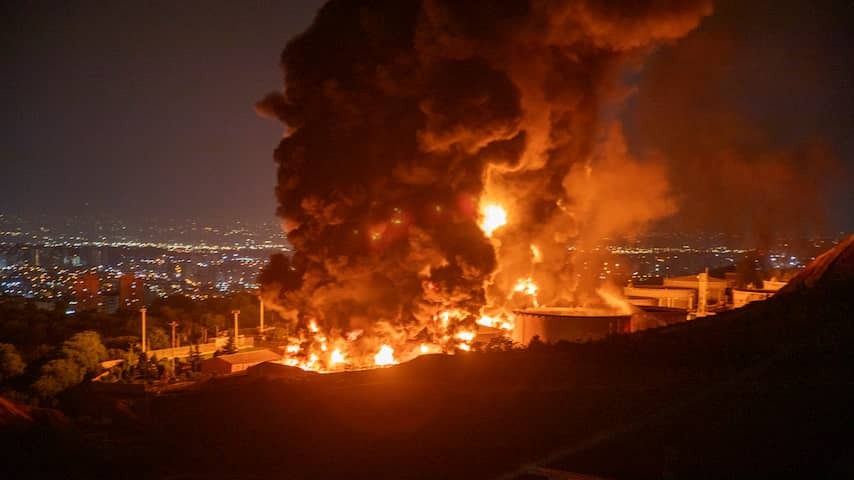
The day after the US attack on Iranian nuclear facilities, you sent in hundreds of questions about this American interference. Defense expert Ko Colijn answers your best and most frequently asked questions.
How close are we to a third world war?
“Not, I think and hope. Because Russia is virtually out of this. After Syria, it is losing another ally for the time being, but may benefit overall from rising oil prices if Iran closes the Strait of Hormuz. China is also on the sidelines, although it takes sides with Iran. But otherwise that country will at most present itself as a champion of peace and hope that the Strait of Hormuz remains open, because many tankers are heading to China.”
The NATO summit is starting, and many important people are coming. How likely is it that the summit and we as the Netherlands will become a target?
“Zero point zero. There could at most be some cyber attacks.”
Can the US expect NATO support under NATO Article 5 now that Iran has retaliated?
“No, because Iran is not retaliating on NATO territory itself, but in the Middle East, as happened on Monday evening. Article 5 does not mean that a NATO member receives protection anywhere in the world, but is geographically determined; it is purely about what takes place in those countries themselves.”
Does the American interference – directly or indirectly – have consequences for the war in Ukraine? For example, that less war material from Iran is available to Russia? Or that Russia will support Iran and thereby weaken its own position in Ukraine?
“Yes, somewhat. The attention for Ukraine will weaken even further in Washington. That is a kind of encouraging signal for Putin, who really considers winning in Ukraine more important than losing Iran. And American war supplies and/or arms shipments destined for Ukraine will now go to American-Israeli bases in the Middle East. Or they have already gone that way.”
What are actually the reactions of China and Russia to the bombings, given the partnership that Russia concluded with Iran in early 2025?
“China is now posing as a guardian of international law and has supported Iran. That is remarkable insofar as it has always avoided or even denied that position regarding Ukraine. The US-China conflict – already spoiled by the Taiwan issue and the tariff war – has now become very clear.”
“In the case of Russia, it is striking that the Kremlin has called the American action ‘irresponsible’, but does not completely condemn it either. Putin has even presented himself as a possible mediator. You could call it a moderate condemnation.”
Which nuclear weapons agreements has Iran exactly violated?
“Iran has not properly addressed or even left unanswered inspections of nuclear facilities and questions about the how and why after 2019. That is contrary to obligations it has regarding Iran’s membership of the so-called non-proliferation treaty, the international agreements that limit the possession of nuclear weapons. The control thereof is in the hands of the IAEA (International Atomic Energy Agency). IAEA Director Rafael Grossi said the following to his board of governors on June 9:”
‘As you know, the IAEA has found man-made uranium particles at all three locations in Iran that we gained access to in 2019 and 2020. After that, we asked Iran for explanations and motivations, including in a number of important consultations that I myself was involved in. Unfortunately, Iran has repeatedly failed to answer those questions, or has not provided technically credible answers. It also appears that the locations have been cleaned, which hinders this search by the IAEA.‘
“Incidentally, Iran is still a member of the non-proliferation treaty, the IAEA inspectors are still in their hotel in Tehran and the IAEA condemns any military attack on an ‘innocent’ (peaceful) facility. That is precisely the problem: what is peaceful? And who determines that?”
What are the consequences if nuclear material is hit during bombings?
“Then it is no longer possible for the IAEA to control the nuclear activities at all. And of course the spread of toxic (radioactive) substances. But the IAEA has no signals that this is actually the case. Iran says that it had moved the enriched uranium to safe storage locations very quickly before the American attack, but that has not been proven. And nothing is known about a secret relocation of hundreds of suspicious ultracentrifuges either.”
What possible consequences does the American attack have for the relationship between the US and Russia?
“Besides the answer I already gave above about the war in Ukraine, there are no strategic consequences. Although Putin will see these developments as a further indication that he can have his way in Ukraine. It would not even surprise me if Trump had told him in advance that the American B2 bombers with their bunker busters were not heading to Russia. They are, after all, strategic bombers, and even Trump is not waiting for a misunderstanding.”
How can the American attack be assessed from the perspective of international law? On the basis of which legal grounds could the US claim to be operating within the boundaries of the law?
“An attack on a nuclear facility is risky anyway (think of the chance of radioactive fall-out during the skirmishes around the nuclear power plant near Zaporizhzhia in Ukraine), so an attack on a military facility is forbidden anyway.”
“And furthermore: any more or less short and acute military attack, which is carried out in self-defense, is allowed preventively if there is a concrete threat. And even a little earlier: soldiers then speak of a preemptive attack. In the US, the president can unleash such a surprise action on his own, but he or she must then inform Congress within two months and ask for permission. As president, Trump is commander-in-chief of the army, but pays little attention to his subordinates and members of Congress.”